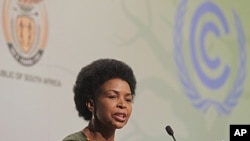The United States' major agenda at this year's U.N. climate summit in Durban, South Africa (COP 17) has been to promote new systems to finance projects that combat or mitigate the effects of climate change. But the U.S. position at the talks has not been well-received.
One of the major issues being considered this year at the COP 17 climate summit is the implementation of a Green Climate Fund (GCF).
The idea, agreed to at the previous climate summit in Cancun, Mexico, is to raise funds to help developing nations reduce emissions and adapt to the adverse effects of climate change.
Most of the countries on the committee that designed the fund agreed on the terms at a meeting in October, except for the United States and Saudi Arabia, which raised objections.
The U.S. deputy special envoy for climate change, Jonathan Pershing, says that one of the issues for the United States is how the fund will be financed.
"In our view, one of the really big new developments in climate financing is going to be private sector investment, and you want a fund like this to leverage investment as effectively as possible," said Pershing. "At the moment, it doesn't do it as well as it could. We think some shifts in the language could open up a door for that really large-scale financing that we'd like."
The GCF would be the major component of the deal reached in Cancun to raise $100 billion by 2020 to fund climate projects.
In its current form, the GCF already allows private sector investment. Some groups are concerned that opening up a specific "private sector window" could create problems.
Sasanka Thilikasiri, an international policy advisor for the humanitarian aid group Oxfam, says it is important that private firms be held accountable.
"The private sector has a role to play, don't get us wrong - they have incredible amount of capital that they can invest in the right way. But it's investing it in the right way, and there's concern that, if there's a specific private sector window, it would give private sector direct access to certain projects. And when we talk about climate financing it's absolutely important that it's got to go through the GCF itself and have country determination on how that money's going to be spent," said Thilikasiri.
Oxfam's American chapter recently signed a letter to Secretary of State Hillary Clinton, along with 15 other organizations, expressing concern about U.S. policy at the climate talks. One of the concerns was that U.S. objections to the Green Climate Fund could stall its implementation.
It also urged U.S. negotiators to be more flexible in their refusal to accept a legally binding commitment to cut greenhouse gas emissions, including the agreement laid out in the Kyoto Protocol.
The criticism of the U.S. position is nothing new. The world's historically biggest polluter has historically been lambasted at U.N. climate conferences, including COP 17 in Durban.
Asked about the seemingly open hostility towards the United States at past and present meetings, Pershing says the trouble is communication.
"I'm always struck by, in these conversations, is when you dig in, you find people are enormously interested in working with the U.S., who find the U.S. to be a really powerful force for good. But we have a lack of ability to convey those stories well," noted Pershing.
Pershing had just participated in a presentation at the U.S. pavilion in Durban, outlining U.S. involvement in the Fast Start climate financing program launched at the U.N. summit in Copenhagen two years ago.
The program supports forestry, energy and adaptation projects around the world. And the U.S. recently revealed it had raised over $3 billion for the program this year, compared to $2 billion the year before.
US Faces Criticism for Climate Financing Push at Durban
- By Gabe Joselow














